| Reviews & Columns |
|
Reviews DVD TV on DVD Blu-ray 4K UHD International DVDs In Theaters Reviews by Studio Video Games Features Collector Series DVDs Easter Egg Database Interviews DVD Talk Radio Feature Articles Columns Anime Talk DVD Savant Horror DVDs The M.O.D. Squad Art House HD Talk Silent DVD
|
DVD Talk Forum |
|
|
| Resources |
|
DVD Price Search Customer Service #'s RCE Info Links |
|
Columns
|
|
|
Piano Teacher: The Criterion Collection, The
The Criterion Collection // R // September 26, 2017
List Price: $39.95 [Buy now and save at Amazon]
The Film:
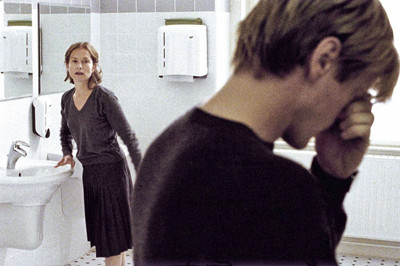 Commitment and dedication entwine into one of the more complex, tough-to-decipher elements of the human condition, pushing people beyond the brink of their comfort zone to accomplish or obtain something meaningful to them. The pursuit could be leading toward an artform, a noteworthy position in society, or the affection of another person; no matter which one, the mentality of the pursuer can twist their focus in narcissistic and arguably malevolent directions if the path becomes difficult. This is merely the foundation to Michael Haneke's The Piano Teacher, a challenging exploration of psychological and sexual torment involving a revered forty-something concert performer and instructor, whose devotion to her craft -- and her problematic personal relationships -- have warped her perception of social norms and intimacy. Haneke's methodical, unflinching approach to filmmaking savors the provocative nature of the teacher's internal psychosis and external actions, playing out as an unyielding drama that hits a fascinating note between being absorbing to behold and rather tough to watch.
Commitment and dedication entwine into one of the more complex, tough-to-decipher elements of the human condition, pushing people beyond the brink of their comfort zone to accomplish or obtain something meaningful to them. The pursuit could be leading toward an artform, a noteworthy position in society, or the affection of another person; no matter which one, the mentality of the pursuer can twist their focus in narcissistic and arguably malevolent directions if the path becomes difficult. This is merely the foundation to Michael Haneke's The Piano Teacher, a challenging exploration of psychological and sexual torment involving a revered forty-something concert performer and instructor, whose devotion to her craft -- and her problematic personal relationships -- have warped her perception of social norms and intimacy. Haneke's methodical, unflinching approach to filmmaking savors the provocative nature of the teacher's internal psychosis and external actions, playing out as an unyielding drama that hits a fascinating note between being absorbing to behold and rather tough to watch.
Erika Kohut (Isabelle Huppert), our piano teacher, lives in a spacious apartment that seems far more cramped than it probably should due to the presence of her mother (Annie Girardot), a doting but overbearing figure in her life. She splits her time between private recitals for wealthy families and teaching up-and-coming virtuosos at a masterclass conservatory, during which she applies a severe, cold method of dominant instruction. Caught between those extremes of authoritarianism, Erika has developed a streak of odd perversions and masochism, leading her to seedy places where she can satisfy her unique urges. In steps Walter Klemmer (Benoit Magimel), an engineer and fledgling -- yet quite talented -- piano player who becomes infatuated with Erika, both for her talents and her unique persona. Little does he know of The Piano Teacher's idiosyncrasies, but he certainly discovers them as his advances become more overt, drawing him into the distorted and vindictive web that she's woven around her life.
From the top of The Piano Teacher, Haneke offers a portrait of an average day in Erika's life, in which the audience witnesses how she, like everyone else, undergoes waning enthusiasm as the hours pass. Her energy is of a different variety, though, where one almost pities the suffering pupils attending sessions early in her day more than those near the end, an experience Haneke captures with spare, inventive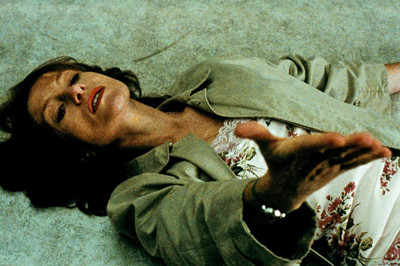 chilliness through multiple shots of different students' fingers fluttering along the piano keys as they play -- beautifully, but not beautifully enough -- for her. Between Erika's overbearing relationship with her mother and a domineering presence around her class attendees, the negative energy of repression emerges through the director's representation of how the performing arts can be manipulated into a petrifying battleground, one in which nearly all joy has been extracted from the sterile white chambers and echoic practice halls. Long before Haneke gets to the film's more abrasive attributes, he's generated an atmosphere of unpleasantness for all in the teacher's presence, including the audience.
chilliness through multiple shots of different students' fingers fluttering along the piano keys as they play -- beautifully, but not beautifully enough -- for her. Between Erika's overbearing relationship with her mother and a domineering presence around her class attendees, the negative energy of repression emerges through the director's representation of how the performing arts can be manipulated into a petrifying battleground, one in which nearly all joy has been extracted from the sterile white chambers and echoic practice halls. Long before Haneke gets to the film's more abrasive attributes, he's generated an atmosphere of unpleasantness for all in the teacher's presence, including the audience.
The Piano Teacher makes one ponder where -- or if -- tenderness and intimacy could slip into Erika's tyrannical framework of an existence, a consideration that receives unexpected answers through depictions of self-mutilation, olfactory gratification in a sex shop, and public voyeurism. Based off Elfriede Jelinek's novel written in 1983, Haneke's restructured telling of the story immediately yearns to make the viewer uncomfortable, touching upon the ways in which someone's perception of controlling others can manifest within these fundamental areas of their social and personal life. The director's craftsmanship exposes very little nudity, with each scene involving the extremities of Erika's perversion obscuring the physical actions involved: the slicing, the jerking, what she's smelling. This emphasizes the full gamut of grotesque or awkward responses of those involved, and while there's nothing pleasurable about watching what transpires, there's no shortage of unflinching stimulation, either.
Isabelle Huppert's bravery and restraint within the performance becomes crucial to the effectiveness of The Piano Teacher. While this might be a frequently used comment about certain roles, there are demands placed upon the actress embodying Erika that extend well beyond the margins of decency, checking off numerous explicit and compromising scenarios that'd deter other actresses if even one of them appeared in a potential script. Huppert not only engages the lurid content, she brings a very specific element of grim emotionality to the character's paraphilia, elevated by slight changes in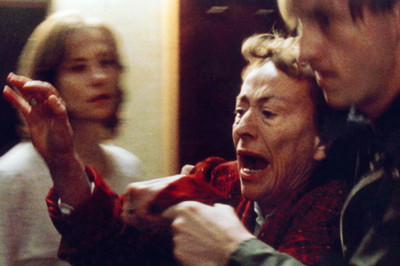 her stony expression as she explores the nuances of the extremes involved with domination and submission. With Benoit Magimel as a sincere, albeit unlikely counterpoint to Erika as the handsome pupil unashamedly infatuated with her strictness, Huppert takes what could easily be an overtly histrionic and shocking display of psychosis and brings it perilously down to earth, bequeathing earnest humanity and quiet ferocity to her abusive and borderline spiteful tendencies.
her stony expression as she explores the nuances of the extremes involved with domination and submission. With Benoit Magimel as a sincere, albeit unlikely counterpoint to Erika as the handsome pupil unashamedly infatuated with her strictness, Huppert takes what could easily be an overtly histrionic and shocking display of psychosis and brings it perilously down to earth, bequeathing earnest humanity and quiet ferocity to her abusive and borderline spiteful tendencies.
The Piano Teacher does venture beyond certain reasonable limits as it proceeds, though, in which the shocking events that happen are reliant on on Erika's youthful suitor sticking with his obsession through demanding scenarios and betraying his articulated principles. Amid Haneke's shrewd handling of their evolving relationship, this element of the story triggers burdensome, borderline didactic themes involving the temptation and corruption of seemingly well-adjusted people, how far they're willing to go for emotional attachment and how powerful the compulsion of these darker desires can be upon the impressionable. The elements that make The Piano Teacher absorbing to watch once can also make it rather difficult to watch again, both from a visceral standpoint and a contextual one: the layers of Erika's twisted perception on intimacy and yearning for control of other people cuts deep into the unpleasantness of sexual deviance, stringing together a checklist of controversial scenes into an abrasive melody. Haneke's film, in itself, demands commitment; how he pushes beyond comfort zones will strike different chords.
The Blu-ray:
The Piano Teacher waltzes onto the Blu-ray format from The Criterion Collection in a customary, unostentatious presentation from the boutique label, introduced as spine #894. The cover artwork duplicates the familiar poster design that captures a pivotal scene from the film, while the interior designs uses restrained textures. Unostentatious photographs fill the enclosed Booklet, which contains information about the transfer, a cast listing and disc production credits, and an Essay from Moira Weigel entitled "Bad Romances".
Video and Audio:
Details about what went into this restoration of The Piano Teacher aren't elaborated upon quite as extensively as other Criterion and Janus-sourced presentations, but this high-definition scan performed in Vienna from the original 35mm negative does have a stamp of approval from Michael Haneke. Therefore, the restrained color presentation, the faintly hazy details, the light black levels and heavier film grain contained within this 1.85:1-framed, 1080p AVC transfer fall into the spectrum of creative intent, all of which makes sense considering the film's vintage and emotional intents. Fine details are in short supply, but they do emerge within strands of hair, ornate textiles in garments, and certain fluids that come in contact with the floor. Contrast levels create reasonable yet unimpressive depth within the image, while shadows and darker garments are light yet well-adjusted to surroundings for visibility. Flesh tones fluctuate depending on the scene, always restrained yet constantly aware of the warmth that emerges from emotional extremes, while a few scarce colors -- a mustard yellow jacket, blue tiles on a bathroom wall, blotches of blood -- project commendable shades of color wherever necessary. Film grain can be heavy, shades look overly washed at times, and black levels can appear unstable in dim sequences, but there's a lot of refinement involved that amounts to a worthwhile upgrade.
As you can probably imagine, a film with intimate objectives like The Piano Teacher centers on the clarity and naturality of dialogue, but the resonance of the music also plays a crucial role in the ambience … and piano strokes are notoriously demanding on the midrange stability of a track. Derived from the original 35mm track, this 5.1 DTS-HD Master Audio hits all the right notes in both of those areas. The French dialogue, with splendidly translated subtitles, enjoys rich clarity and spatial awareness in the front channels, responding to the environment with organic separation. Small sonic details, like the dropping of quarters into a vending slot, footsteps on a wood floor, and sniveling of noses in a waiting room, offer pronounced and razor-sharp details where necessary. Perhaps the most surprising strength of the track comes in how well-balanced the classical, piano-driven music can sound, hitting those complex midrange notes with heft and precision, and without any perceptible distortion. Surround activity spreads out where necessary in concert halls and on street corners, but most of the activity stays confined to the front, as expected. It sounds exceptionally strong.
Special Features:
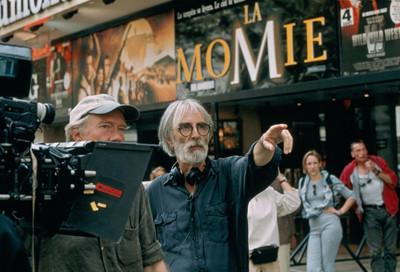 The centerpiece of the extras is a newly-recorded Interview with Michael Haneke (29:43, 16x9 HD), centered specifically on the conceptualization and creation of The Piano Teacher. He starts out discussing how he focused the material of the book into a cinematic perspective, while also offering insights as to how the film contributed to his global appeal and how so much of it swung on the participation of Isabelle Huppert. He also, however, tracks along with specific, notorious scenes from the film in a fashion not unlike a director's commentary track, revealing how specific elements were achieved with movie-making magic and how demanding certain scenes were upon the characters. Haneke also touches upon how the book's author responded to the film, which isn't a straightforward "she loved it" answer in the slightest. It's a fantastic piece.
The centerpiece of the extras is a newly-recorded Interview with Michael Haneke (29:43, 16x9 HD), centered specifically on the conceptualization and creation of The Piano Teacher. He starts out discussing how he focused the material of the book into a cinematic perspective, while also offering insights as to how the film contributed to his global appeal and how so much of it swung on the participation of Isabelle Huppert. He also, however, tracks along with specific, notorious scenes from the film in a fashion not unlike a director's commentary track, revealing how specific elements were achieved with movie-making magic and how demanding certain scenes were upon the characters. Haneke also touches upon how the book's author responded to the film, which isn't a straightforward "she loved it" answer in the slightest. It's a fantastic piece.
The Criterion Collection have also recorded a new Interview with Isabelle Huppert (11:13, 16x9 HD), though it's not as intriguing as the one with the director, falling into a more standard and obligatory rhythm about the impact and psychology of the role, as well as her history with Michael Haneke that dates to before the release of Funny Games. This mostly serves as a retrospective, which compliments the Selected-Scene Commentary With Isabelle Huppert (50:24, 16x9 HD), in which she tackles nearly half of the film's content with thematic and construction discussion; recorded in 2001, it accompanies remastered footage from the film. There's also a unique Post-sync Session (19:09, 16x9 HD) stretch of making-of footage, in which Haneke and Huppert collaborate on the right tone for dialogue and drama as they re-record the lines from the film. There's also a Trailer (1:49, 16x9 HD), which was made after it garnered attention in the festival circuits.
Final Thoughts:
Even among seasoned moviegoers and cineastes, Michael Haneke's The Piano Teacher tends to leave the viewer absorbed by the content but not terribly eager to return to it any time soon. Authoritarianism, sexual deviance, and warped mental states populate this tale of a repressed yet abhorrent music instructor and the pupil whom becomes enamored with her, guiding this character study in unsettling directions that, in the director's distinctive style, aims to deliberately unnerve the audience. Haneke's craftsmanship rarely resorts to blunt shock-value, though, and it never lacks a purpose behind its provocations, amounting to a film that's ... well, it's still quite a challenge to watch, especially a second time, but it possesses meaning within the absorbing ways that it explores and exploits the characters' psychosis. The Criterion Collection's Blu-ray is certainly the way to view it, with a fine audiovisual treatment and a suitable arrangement of extras that include interviews and scene-specific commentary, but limited replay value of this well-made but objectionable piece of work keep this at a lukewarm Recommendation.
Thomas Spurlin, Staff Reviewer -- DVDTalk Reviews | Personal Blog/Site
 Commitment and dedication entwine into one of the more complex, tough-to-decipher elements of the human condition, pushing people beyond the brink of their comfort zone to accomplish or obtain something meaningful to them. The pursuit could be leading toward an artform, a noteworthy position in society, or the affection of another person; no matter which one, the mentality of the pursuer can twist their focus in narcissistic and arguably malevolent directions if the path becomes difficult. This is merely the foundation to Michael Haneke's The Piano Teacher, a challenging exploration of psychological and sexual torment involving a revered forty-something concert performer and instructor, whose devotion to her craft -- and her problematic personal relationships -- have warped her perception of social norms and intimacy. Haneke's methodical, unflinching approach to filmmaking savors the provocative nature of the teacher's internal psychosis and external actions, playing out as an unyielding drama that hits a fascinating note between being absorbing to behold and rather tough to watch.
Commitment and dedication entwine into one of the more complex, tough-to-decipher elements of the human condition, pushing people beyond the brink of their comfort zone to accomplish or obtain something meaningful to them. The pursuit could be leading toward an artform, a noteworthy position in society, or the affection of another person; no matter which one, the mentality of the pursuer can twist their focus in narcissistic and arguably malevolent directions if the path becomes difficult. This is merely the foundation to Michael Haneke's The Piano Teacher, a challenging exploration of psychological and sexual torment involving a revered forty-something concert performer and instructor, whose devotion to her craft -- and her problematic personal relationships -- have warped her perception of social norms and intimacy. Haneke's methodical, unflinching approach to filmmaking savors the provocative nature of the teacher's internal psychosis and external actions, playing out as an unyielding drama that hits a fascinating note between being absorbing to behold and rather tough to watch. Erika Kohut (Isabelle Huppert), our piano teacher, lives in a spacious apartment that seems far more cramped than it probably should due to the presence of her mother (Annie Girardot), a doting but overbearing figure in her life. She splits her time between private recitals for wealthy families and teaching up-and-coming virtuosos at a masterclass conservatory, during which she applies a severe, cold method of dominant instruction. Caught between those extremes of authoritarianism, Erika has developed a streak of odd perversions and masochism, leading her to seedy places where she can satisfy her unique urges. In steps Walter Klemmer (Benoit Magimel), an engineer and fledgling -- yet quite talented -- piano player who becomes infatuated with Erika, both for her talents and her unique persona. Little does he know of The Piano Teacher's idiosyncrasies, but he certainly discovers them as his advances become more overt, drawing him into the distorted and vindictive web that she's woven around her life.
From the top of The Piano Teacher, Haneke offers a portrait of an average day in Erika's life, in which the audience witnesses how she, like everyone else, undergoes waning enthusiasm as the hours pass. Her energy is of a different variety, though, where one almost pities the suffering pupils attending sessions early in her day more than those near the end, an experience Haneke captures with spare, inventive
 chilliness through multiple shots of different students' fingers fluttering along the piano keys as they play -- beautifully, but not beautifully enough -- for her. Between Erika's overbearing relationship with her mother and a domineering presence around her class attendees, the negative energy of repression emerges through the director's representation of how the performing arts can be manipulated into a petrifying battleground, one in which nearly all joy has been extracted from the sterile white chambers and echoic practice halls. Long before Haneke gets to the film's more abrasive attributes, he's generated an atmosphere of unpleasantness for all in the teacher's presence, including the audience.
chilliness through multiple shots of different students' fingers fluttering along the piano keys as they play -- beautifully, but not beautifully enough -- for her. Between Erika's overbearing relationship with her mother and a domineering presence around her class attendees, the negative energy of repression emerges through the director's representation of how the performing arts can be manipulated into a petrifying battleground, one in which nearly all joy has been extracted from the sterile white chambers and echoic practice halls. Long before Haneke gets to the film's more abrasive attributes, he's generated an atmosphere of unpleasantness for all in the teacher's presence, including the audience. The Piano Teacher makes one ponder where -- or if -- tenderness and intimacy could slip into Erika's tyrannical framework of an existence, a consideration that receives unexpected answers through depictions of self-mutilation, olfactory gratification in a sex shop, and public voyeurism. Based off Elfriede Jelinek's novel written in 1983, Haneke's restructured telling of the story immediately yearns to make the viewer uncomfortable, touching upon the ways in which someone's perception of controlling others can manifest within these fundamental areas of their social and personal life. The director's craftsmanship exposes very little nudity, with each scene involving the extremities of Erika's perversion obscuring the physical actions involved: the slicing, the jerking, what she's smelling. This emphasizes the full gamut of grotesque or awkward responses of those involved, and while there's nothing pleasurable about watching what transpires, there's no shortage of unflinching stimulation, either.
Isabelle Huppert's bravery and restraint within the performance becomes crucial to the effectiveness of The Piano Teacher. While this might be a frequently used comment about certain roles, there are demands placed upon the actress embodying Erika that extend well beyond the margins of decency, checking off numerous explicit and compromising scenarios that'd deter other actresses if even one of them appeared in a potential script. Huppert not only engages the lurid content, she brings a very specific element of grim emotionality to the character's paraphilia, elevated by slight changes in
 her stony expression as she explores the nuances of the extremes involved with domination and submission. With Benoit Magimel as a sincere, albeit unlikely counterpoint to Erika as the handsome pupil unashamedly infatuated with her strictness, Huppert takes what could easily be an overtly histrionic and shocking display of psychosis and brings it perilously down to earth, bequeathing earnest humanity and quiet ferocity to her abusive and borderline spiteful tendencies.
her stony expression as she explores the nuances of the extremes involved with domination and submission. With Benoit Magimel as a sincere, albeit unlikely counterpoint to Erika as the handsome pupil unashamedly infatuated with her strictness, Huppert takes what could easily be an overtly histrionic and shocking display of psychosis and brings it perilously down to earth, bequeathing earnest humanity and quiet ferocity to her abusive and borderline spiteful tendencies. The Piano Teacher does venture beyond certain reasonable limits as it proceeds, though, in which the shocking events that happen are reliant on on Erika's youthful suitor sticking with his obsession through demanding scenarios and betraying his articulated principles. Amid Haneke's shrewd handling of their evolving relationship, this element of the story triggers burdensome, borderline didactic themes involving the temptation and corruption of seemingly well-adjusted people, how far they're willing to go for emotional attachment and how powerful the compulsion of these darker desires can be upon the impressionable. The elements that make The Piano Teacher absorbing to watch once can also make it rather difficult to watch again, both from a visceral standpoint and a contextual one: the layers of Erika's twisted perception on intimacy and yearning for control of other people cuts deep into the unpleasantness of sexual deviance, stringing together a checklist of controversial scenes into an abrasive melody. Haneke's film, in itself, demands commitment; how he pushes beyond comfort zones will strike different chords.
The Blu-ray:
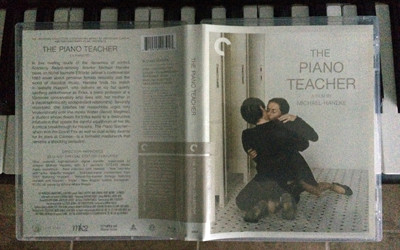 | 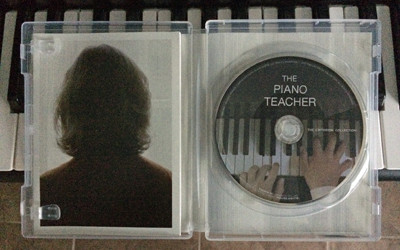 |
The Piano Teacher waltzes onto the Blu-ray format from The Criterion Collection in a customary, unostentatious presentation from the boutique label, introduced as spine #894. The cover artwork duplicates the familiar poster design that captures a pivotal scene from the film, while the interior designs uses restrained textures. Unostentatious photographs fill the enclosed Booklet, which contains information about the transfer, a cast listing and disc production credits, and an Essay from Moira Weigel entitled "Bad Romances".
Video and Audio:
Details about what went into this restoration of The Piano Teacher aren't elaborated upon quite as extensively as other Criterion and Janus-sourced presentations, but this high-definition scan performed in Vienna from the original 35mm negative does have a stamp of approval from Michael Haneke. Therefore, the restrained color presentation, the faintly hazy details, the light black levels and heavier film grain contained within this 1.85:1-framed, 1080p AVC transfer fall into the spectrum of creative intent, all of which makes sense considering the film's vintage and emotional intents. Fine details are in short supply, but they do emerge within strands of hair, ornate textiles in garments, and certain fluids that come in contact with the floor. Contrast levels create reasonable yet unimpressive depth within the image, while shadows and darker garments are light yet well-adjusted to surroundings for visibility. Flesh tones fluctuate depending on the scene, always restrained yet constantly aware of the warmth that emerges from emotional extremes, while a few scarce colors -- a mustard yellow jacket, blue tiles on a bathroom wall, blotches of blood -- project commendable shades of color wherever necessary. Film grain can be heavy, shades look overly washed at times, and black levels can appear unstable in dim sequences, but there's a lot of refinement involved that amounts to a worthwhile upgrade.
As you can probably imagine, a film with intimate objectives like The Piano Teacher centers on the clarity and naturality of dialogue, but the resonance of the music also plays a crucial role in the ambience … and piano strokes are notoriously demanding on the midrange stability of a track. Derived from the original 35mm track, this 5.1 DTS-HD Master Audio hits all the right notes in both of those areas. The French dialogue, with splendidly translated subtitles, enjoys rich clarity and spatial awareness in the front channels, responding to the environment with organic separation. Small sonic details, like the dropping of quarters into a vending slot, footsteps on a wood floor, and sniveling of noses in a waiting room, offer pronounced and razor-sharp details where necessary. Perhaps the most surprising strength of the track comes in how well-balanced the classical, piano-driven music can sound, hitting those complex midrange notes with heft and precision, and without any perceptible distortion. Surround activity spreads out where necessary in concert halls and on street corners, but most of the activity stays confined to the front, as expected. It sounds exceptionally strong.
Special Features:
 The centerpiece of the extras is a newly-recorded Interview with Michael Haneke (29:43, 16x9 HD), centered specifically on the conceptualization and creation of The Piano Teacher. He starts out discussing how he focused the material of the book into a cinematic perspective, while also offering insights as to how the film contributed to his global appeal and how so much of it swung on the participation of Isabelle Huppert. He also, however, tracks along with specific, notorious scenes from the film in a fashion not unlike a director's commentary track, revealing how specific elements were achieved with movie-making magic and how demanding certain scenes were upon the characters. Haneke also touches upon how the book's author responded to the film, which isn't a straightforward "she loved it" answer in the slightest. It's a fantastic piece.
The centerpiece of the extras is a newly-recorded Interview with Michael Haneke (29:43, 16x9 HD), centered specifically on the conceptualization and creation of The Piano Teacher. He starts out discussing how he focused the material of the book into a cinematic perspective, while also offering insights as to how the film contributed to his global appeal and how so much of it swung on the participation of Isabelle Huppert. He also, however, tracks along with specific, notorious scenes from the film in a fashion not unlike a director's commentary track, revealing how specific elements were achieved with movie-making magic and how demanding certain scenes were upon the characters. Haneke also touches upon how the book's author responded to the film, which isn't a straightforward "she loved it" answer in the slightest. It's a fantastic piece. The Criterion Collection have also recorded a new Interview with Isabelle Huppert (11:13, 16x9 HD), though it's not as intriguing as the one with the director, falling into a more standard and obligatory rhythm about the impact and psychology of the role, as well as her history with Michael Haneke that dates to before the release of Funny Games. This mostly serves as a retrospective, which compliments the Selected-Scene Commentary With Isabelle Huppert (50:24, 16x9 HD), in which she tackles nearly half of the film's content with thematic and construction discussion; recorded in 2001, it accompanies remastered footage from the film. There's also a unique Post-sync Session (19:09, 16x9 HD) stretch of making-of footage, in which Haneke and Huppert collaborate on the right tone for dialogue and drama as they re-record the lines from the film. There's also a Trailer (1:49, 16x9 HD), which was made after it garnered attention in the festival circuits.
Final Thoughts:
Even among seasoned moviegoers and cineastes, Michael Haneke's The Piano Teacher tends to leave the viewer absorbed by the content but not terribly eager to return to it any time soon. Authoritarianism, sexual deviance, and warped mental states populate this tale of a repressed yet abhorrent music instructor and the pupil whom becomes enamored with her, guiding this character study in unsettling directions that, in the director's distinctive style, aims to deliberately unnerve the audience. Haneke's craftsmanship rarely resorts to blunt shock-value, though, and it never lacks a purpose behind its provocations, amounting to a film that's ... well, it's still quite a challenge to watch, especially a second time, but it possesses meaning within the absorbing ways that it explores and exploits the characters' psychosis. The Criterion Collection's Blu-ray is certainly the way to view it, with a fine audiovisual treatment and a suitable arrangement of extras that include interviews and scene-specific commentary, but limited replay value of this well-made but objectionable piece of work keep this at a lukewarm Recommendation.
|
| Popular Reviews |
| Sponsored Links |
|
|
| Sponsored Links |
|
|
| Release List | Reviews | Shop | Newsletter | Forum | DVD Giveaways | Blu-Ray | Advertise |
|
Copyright 2024 DVDTalk.com All Rights Reserved. Legal Info, Privacy Policy, Terms of Use,
Manage Preferences,
Your Privacy Choices | |||||||














